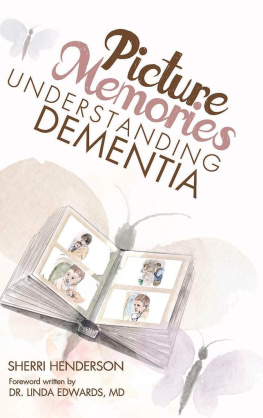What people are saying:
Picture Memories Understanding Dementia is a beautifully written book that explains Alzheimers disease in a most sensitive manner. The Henderson familys understanding of the needs of family members facing this diagnosis for children with intellectual disabilities is impressive and their ability to communicate what the disease means is nothing short of phenomenal! The book is breathtakingly beautiful and will help any family dealing with this diagnosis. It is a must read.
Suzanne Sewell
President & CEO
Florida ARF
It made me cry - and it made me smile, both of which are crucial for a reader in order to get the full impact of the books meaning. I think if is a clear explanation for people of all ages - even those of us who think we understand this disease because we know the medical facts; this goes beyond the facts of the body and brings home the facts of the heart. I see this book as helping not only families whose loved one has Down syndrome, but all families facing this new journey. Thanks to Trey and the Hendersons for sharing so much of their own lives in order to bring information and encouragement to the lives of so many others.
Laura Watts
Co-foundeer
Jacksonville Down
Syndrome Assiciation
Although originally written to help the patient, this well written, easy to understand and beautifully illustrated book can help others, especially young family members, better empathize with a loved one who is suffering from dementia. It will be an essential addition to my own bookshelf.
Dr. Joseph Sarachene, MD
Physiologist
Picture Memories Understanding Dementia is a beautiful and touching book providing an understanding of Alzheimers and dementia. This poignant, well written and illustrated book gives an explanation in simplistic terms and provides insight to families who are struggling to understand and cope with dementia and Alzheimers.
Leslie Weed
Co-Founder
HEAL Foundation

SHERRI HENDERSON
Illustrated by
ANI BARMASHI
Foreword written by
DR. LINDA EDWARDS, MD
Picture Memories - Understanding Dementia By Sherri Henderson
Copyright 2018 by Sherri Henderson.
First Edition
All rights reserved. No part of this publication may be reproduced, distributed, or transmitted in any form or by any means, including photocopying, recording, or other electronic methods, without the prior written permission of the publisher, except in the case of brief quotations embodied in critical reviews and certain other noncommercial uses permitted by copyright law.
For permission requests, write to the publisher, Attention: Permissions Coordinator, at the address below:
Henderson Haven, Inc.
772 Foxridge Center Dr.
Orange Park, FL 32065
www.HendersonHaven.org
Ordering information: Quantity sales. Special discounts are available on quantity purchases by corporations, associations, and others. For details, contact the publisher at the address above.
Printed in the United States of America
LCCN: 2018936222
ISBN: 978-1-7320118-0-9
ISBN: 978-1-7320118-1-6 (e-book)
How often do we use the phrase a picture is worth a thousand words? Imagine trying to explain to a young adult with Down syndrome and intellectual disability the reason their memory is declining. We know that persons with Down syndrome are more likely to experience dementia, but nothing prepares parents, caregivers and loved ones for this devastating reality when it happens. Perhaps the most troubling aspect of all is that the young adult with dementia may not be able to share what they are thinking: what they fear, what they do or do not understand. The author has offered a thoughtful approach she and her family are using to talk with their son about this new chapter in his and their lives.
Dementia, or loss of picture memories, as is so eloquently described by the author, affects over 5% of adults over the age of 65. Although this book has been written to help young adults who are beginning to lose their picture memories, families, caregivers, loved ones and physicians can learn from this simple but eloquent description of dementia. The phrase picture memories will forever be on my mind when I am talking with patients and their loved ones about dementia, regardless of their age. I am thankful to the author and illustrator for their simple but beautiful book to help young adults with fading memory understand and adapt to this new chapter in their lives.

Dr. Linda R. Edwards, M.D.
Senior Associate Dean for Educational Affairs; Chief,
Division of General Internal Medicine; Associate Chair,
Department of Medicine; Medical Director, Program for Adults with Intellectual and Developmental Disabilities
UF Health Shands, Jacksonville, FL

You have Alzheimers, the doctor says.

So what does that mean?

Lets start when were small.

Our brain begins to take pictures of people, places and things important in our lives.

They are the very best pictures.
We keep them in our hearts and minds to remember.

Every day for the rest of our lives, our brain keeps taking these picture memories.

Some pictures help us remember people and places important to us.

Some help us to remember how to do things.

Some picture memories remind us what foods we like.

And some remind us how to take care of ourselves.

Some picture memories make us sad,

Next page


























